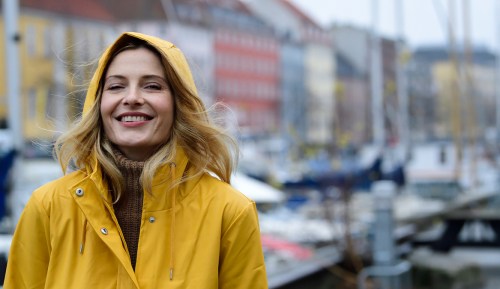Our editors independently select these products. Making a purchase through our links may earn Well+Good a commission
This Is One of the Top Happiness Secrets From Denmark—One of the Happiest Countries in the World
If you're looking to increase happiness, look no further than the top Danish happiness secret. Here, learn what the tip is and how to use it.

Denmark is often regarded as one of the happiest countries in the world, so it only makes sense for all folks to look to the Danes for tips surrounding mood boosts. There are, of course, myriad factors that contribute to Denmark having increased happiness, but even so, we might all benefit from learning the country’s top happiness secret. And according to Helen Russell, a global happiness expert and author of The Year of Living Danishly and The Atlas of Happiness, it’s trust.
Experts in This Article
journalist, speaker, author
“I grew up with the full force of the ‘stranger danger’ campaign—we were taught to trust less as kids,” says Russell, who grew up in the United Kingdom and is now living in Denmark. In Denmark, Russell adds, “trust has always been high…kids are taught to trust, that the world is an essentially good place and most people are not out to get them—which is liberating.” Needless to say, this outlook goes opposite to the “life’s not fair” trope that’s popular in many areas of the world, and thus, can be a mindset many could adopt to increase happiness.
When Russell moved to Denmark, she immediately noticed that her new neighbors “looked more relaxed and healthier. They walked more slowly. They took their time to stop and eat together, or talk, or just breathe,” she says. This perceived sense of relaxedness may be a result of the Danish government providing extensive parental leave, the reality that Danish folks spend a lot of time outdoors, and also that they prioritize connecting with the people in their lives, says Russell.
“Trusting makes you feel more secure and saves unnecessary stress. Trusting people around you can make them behave better, so trust becomes a self-fulfilling prophecy.” —Helen Russell, global happiness expert
However, trust is the top Danish happiness happiness secret because, regardless of national policies and the like, anyone can start working toward attaining it—meaning, no one needs to hope for systemic changes as a prerequisite. Rather, people can start making changes in their own lives. “Trusting makes you feel more secure and saves unnecessary stress,” says Russell. “And trusting the people around you can make them behave better, so trust becomes a self-fulfilling prophecy.”
It’s worth noting that this isn’t an observation Russell made in isolation, either. According to the Ministry of Foreign Affairs of Denmark, trust is a cornerstone of Danish culture, extending to peers and the government and its officials alike. “Denmark is the least corrupt country in the EU, and even politicians, [who are] notoriously untrusted in most countries, enjoy a relatively good reputation,” says Russell. “They’re thought of as normal people: accessible, reasonable—for the most part—and doing their best to run the country.”
Russell posits that this trust in their government—backed up by seeing results—contributes to Danish people being compliant and open to paying their taxes. “Most people don’t mind paying 50 percent taxes because there’s a trust that the government will spend the money wisely—and trust that everyone else will also contribute their fair share,” says Russell.
Because the Danish government takes steps to care for its citizens (which the citizens trust the the government to do), Danish folks aren’t scared that their neighbors will rob them in order to survive, Russell says, which in turn facilitates even more trust. A 2019 study in which researchers dropped wallets, some with money and some without, on streets worldwide found that Danes turned in the wallet 80 percent of the time. Other countries had a return rate of 10 percent.
For this reason, Russell says the concept of trust can be confusing to folks from other nations, many of whom were taught to be wary of strangers growing up. “Internationals always joke that there is no such thing as health and safety in Denmark: candles everywhere and 6-year-old kids sawing wood at a park in the forest on the weekend,” says Russell. But, she adds, these normalcies are a reflection of trust that allows children to “grow up free” and happy.
Danes also showcase trust in each other by leaving rails of clothes and shoes outside of retail shops because “there is trust that no one will steal them,” says Russell. “You can walk home after a night out as a woman in Denmark and feel safe, which I do not take for granted, even nine years in,” she adds.
While it’s important to be mindful of safety concerns related to where you do live (for instance, don’t take this Danish happiness tip as a suggestion to walk home alone in the dark or leave your belongings unattended), there are certain components of distrust we may benefit from unlearning. For instance, because trust is the top Danish happiness secret, people certainly stand to benefit from working on trust issues and learning the five components of trust to exercise more of it when and where we each can do so safely.
Oh hi! You look like someone who loves free workouts, discounts for cutting-edge wellness brands, and exclusive Well+Good content. Sign up for Well+, our online community of wellness insiders, and unlock your rewards instantly.
Sign Up for Our Daily Newsletter
Get all the latest in wellness, trends, food, fitness, beauty, and more delivered right to your inbox.
Got it, you've been added to our email list.










